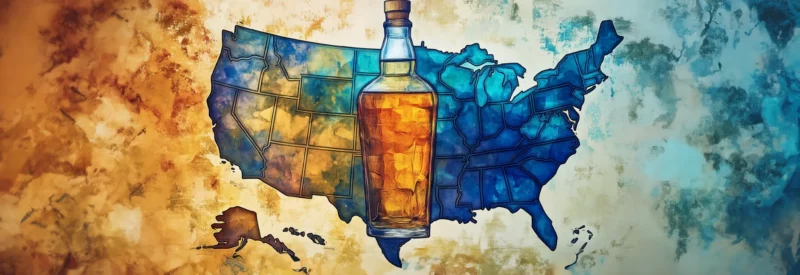
The average gross profit margin for bars is somewhere between 70 to 80 percent, making it one of the most profitable industries to enter.[1]Glimpse. “Average Bar Profit Margins And How To Maximize Yours“. Accessed April 14, 2022. However, preparation is an essential ingredient to the delicate cocktail that is launching a successful bar business. Such preparation includes obtaining a liquor license.
If you’re wondering how to get a liquor license, this article outlines the types of licenses available, as well as state-specific license requirements. Read on to learn everything you need to know about licenses served straight up. (Or on the rocks, if that’s what you prefer.)
What Is a Liquor License?
A liquor license legally permits a business to sell and/or serve alcohol. Every state issues its own licenses, but the conditions for obtaining such vary by state. Additionally, each state has its own Alcohol Beverage Control (ABC) agency that evaluates whether businesses meet and maintain the conditions for a license.
What Are the Different Types of Liquor Licenses?
There are different types of licenses. The type you need to acquire depends on the business model you’re opening, be it a bar, restaurant, brewery, or liquor store. Below are the most common types of liquor licenses:
On-license vs. off-license
Beer and wine license
As the name implies, this is a license permitting a business to sell and serve only beer and wine. Since it only allows beer and wine, this license is most suitable for restaurants not seeking to serve cocktails.
Restaurant liquor license or an “All Liquor License”
A restaurant license permits restaurants to serve beer, wine, and liquor on location. However, some states limit earnings from the sale of alcohol with an all liquor license.
Server license
A server license, broadly known as a server permit, allows servers to sell beer, wine, and liquor at establishments with an on-license.
Tavern liquor license
A tavern license allows for the sale of alcohol for consumption on the premises. However, you can only obtain this license if more than 50 percent of your business’s sales come from selling liquor.
What type of liquor license do I need?
If you’re interested in selling liquor to be enjoyed within your establishment, you need an on-license. But if you’d rather sell liquor to be enjoyed outside of your establishment’s premises, an off-license is what you need.
Next, you should decide whether you want to serve only beer and wine or all types of alcohol. If you’re interested in only selling beer and wine, a beer and wine license is perfect for you. Otherwise, you may choose between a restaurant liquor license or a tavern liquor license.
How Much Is a Liquor License?
If you’re wondering how much a liquor license costs, it depends on the state.[2]Ballotpedia. “Liquor license costs by state, 2018“. Accessed April 14, 2022. It can range from $100 in Idaho to $13,800 in California.
Furthermore, the average cost of obtaining a liquor license is around $1,407. This number includes fees for application, processing, and other various necessities of the process.

What Are the Requirements for a Liquor License?
Each type of license has its own requirements. For instance, you can only obtain a tavern license if your alcohol sales are more than 50 percent of your total sales. You cannot obtain an on-license if you’re planning to serve alcohol off your business’s premises. Additionally, the laws for obtaining a license differ by state, so you need to consult your state’s ABC board.
How to Get A Liquor License in 5 Steps
How to get a liquor license varies by state, but below is a general step-by-step guide to obtaining a license.
Step 1: Research the liquor laws in your state
When in doubt regarding your state’s specific liquor laws, you can always contact the appropriate ABC board. You can also research on the internet for any additional information you need.
Don’t forget to ask your state’s ABC board whether there are any alcohol restrictions in the area you’re planning to do business.
Step 2: Apply with the alcohol control agency in your location
In the application, you must provide essential information for the persons applying and for the establishment. Each state asks for different documents, but most ask for:
- An employee identification number (EIN)
- Photos of your establishment
- A proposed menu
- A certificate of incorporation (if applicable)
- Partnership agreement (if applicable)
Step 3: Acquire all other business permits needed
Besides the above documents, you’ll likely need to provide your business permits. These include permits such as a general business license, professional license, health and safety permits, building and zoning permits, and sales tax permits.
Step 4: Defend your proposal
In the event a local community member protests against your license application, you may need to defend your application. Fearing your establishment will lead to noisiness, disorderly conduct, and other unwelcomed changes to their neighborhood, local citizens may lobby governing bodies to reject your request for a liquor license.
In defending your application, it’s best to reassure citizens that you have practices in place to prevent negative changes. In addition, you might remind them of the positive changes your establishment will bring to the community, such as employment opportunities and the generation of tax revenue from alcohol sales. However, you don’t have to do this alone. You can enlist the services of a liquor license defense attorney, as they are well-versed in defending licenses at all points in their lifecycles.
Step 5: Renew your liquor license
Your liquor license won’t last forever. A license is typically valid for one to three years. After this period, you can’t continue selling alcohol without renewing your license.
How to Apply for a Liquor License in Each of the 50 States
Alabama
To acquire a liquor license in Alabama, you need to bring a pre-application form and checklist to an appointment with an Alabama ABC official. The cost in Alabama ranges from $100 to $1,000.
Alaska
To obtain a liquor license in Alaska, you need to send an application to its ABC board and post it on your location for 10 days. After that, you may have to wait quite some time because Alaska runs your application through many agencies. The price for a license goes from $50 to $2,500.
Arizona
The state of Arizona has more than 20 types of licenses. Each has its own application process. The cost for an Arizona license is between $100 and $2,000.
Arkansas
Regulated by the Arkansas ABC Division of the Department of Finance and Administration, there are six types of liquor licenses in Arkansas. They cost somewhere between $100 and $3,000.
California
For a liquor license in California, go to your nearest ABC board and apply there. The cost of a license in California is between $1,000 and $16,500.
Colorado
The Colorado Department of Revenue handles the state’s licenses. Before applying, you must first be approved by your local government. Licenses cost from $22 to $1,000 for local fees and from $220 to $1,000 for state fees.
Connecticut
To get one of the 26 liquor licenses available in Connecticut, send your license-specific application to the Department of Consumer Protection. License fees cost between $20 and $2,650.
Delaware
To acquire a liquor license in Delaware, send an application to the Office of the ABC Commissioner. The cost in Delaware is between $150 and $2,000.
Florida
To get a license in Florida, you need to mail your application to the Division of Alcoholic Beverages & Tobacco. The cost in Florida varies on the county’s population.
Georgia
To sell alcohol in Georgia, you need three different types of licenses: a local alcohol license, a state alcohol license, and a Federal Basic Permit. Costs for them start at $10 and go up to $1,000.
Hawaii
Idaho
Idaho’s quote system makes it quite difficult to get a liquor license in this state. All areas begin with two licenses. For every 1,500 residents, the area receives another license. You can submit an application to the Idaho ABC with the appropriate documentation. Beer and wine licenses cost $50 and a liquor license costs $750.
Illinois
The Illinois Liquor Control Commission issues licenses in the state. You need to submit an application alongside your local liquor license, sales tax number, and federal employer identification number. The cost of a retailer’s alcohol license is a flat $750.
You can submit an application to the Indiana Alcohol & Tobacco Commission. The ATC recommends everyone apply for a permit at least 90 days before opening. A license in Indiana costs from $50 to $4,000.
Iowa
The Alcohol Beverages Division issues Iowa’s licenses. Due to the high volume of applications, you need to send your application at least 45 days before opening. Iowa’s liquor licenses cost start at $1 and go up to $2,000.
Kansas
Through the Department of Revenue, Kansas issues liquor licenses to those interested. Before applying, you need to be registered for business taxes and have a valid Tax Clearance Certificate. The cost in Kansas is between $10 to $10,000.
Kentucky
The ABC of Kentucky only accepts online applications. All others will be rejected. In the city of Louisville, the cost of getting a liquor license goes from $25 to $3,000.
Louisiana
The Louisiana Office of Alcohol and Tobacco Control has applications for on-premise and off-premise licenses. Prices range between $120 and $345.
Maine
You can send an application with the necessary documents to the Maine Bureau of Alcoholic Beverages & Lottery Operations. The cost of a license cost in Maine is somewhere between $50 and $2,000.
Maryland
The state of Maryland doesn’t have one universal application process, as each of its counties has its own. In most counties, there’s an application fee of $600.
Massachusetts
To get a liquor license in Massachusetts, you need to apply for a retail license in person. After that, you need to publish an advertisement for a public hearing. The license comes with a processing fee of $200.
Michigan
Michigan’s Liquor Control Commission issues the state’s liquor licenses. Additionally, you can book a virtual or in-person appointment if you have any questions regarding your application. Fees are around $1,000 for most license types.
Minnesota
Liquor licenses in Minnesota are issued by the governments of each county. However, the country-specific processes are overseen by the Alcohol and Gambling Enforcement. The annual fee is $125.
Mississippi
To get a license in Mississippi, sign up for an account with the state’s Department of Revenue. Fees for Mississippi liquor licenses can be as high as $9,000.
Missouri
Within the Missouri Department of Public Safety, the Alcohol & Tobacco Control department issues licenses. The prices for which are as low as $25 and as high as $1,000.
Montana
Liquor licenses are issued by the Montana Department of Revenue. With the available licenses divided into categories, if you want to know the cost, pick a category and go from there.
Nebraska
The Nebraska Liquor Control Commission evaluates all applications in the state. You can send in your applications via mail, email, or fax. The state’s fees go up to $600.
Nevada
Nevada does not have any sort of state-wide ABC law. According to Nevada’s Department of Taxation, if you want to start an establishment that serves alcohol, you should contact your city or county authorities. Fees are usually between $25 to $75,000.
New Hampshire
In New Hampshire, the Division of Enforcement’s Liquor Commission issues liquor licenses. Its website’s information regarding licensing is pretty comprehensive.
New Jersey
New Jersey has its own ABC board that deals with liquor licenses. It has an online application system. New Jersey’s licensing fees are between $31 and $12,500. You also need to pay an application filing fee of $200.
New Mexico
New Mexico’s Regulation & Licensing Department is in charge of issuing licenses in New Mexico. Applications of any kind must be mailed with a $10 money order and a copy of your government-issued photo ID.
New York
In New York, the New York State Liquor Authority is responsible for issuing licenses. The application process is online through an application wizard that will you through it. Fees in New York are as low as $20 and as high as $4,500.
North Carolina
The ABC Commission of North Carolina issues liquor licenses in the state. All you need to do is go to an ABC Commission office between 8 am and 3 pm to talk to an official. If it’s after 3 pm, you can leave your application with the receptionist. You may also mail it to them. Depending on the permit type, the fee can be as high as $1,000.
North Dakota
To get a liquor license in North Dakota, you first have to be licensed by the North Dakota Attorney General. After that, submit an application at least four to six weeks before opening your establishment.
Ohio
Ohio’s Department of Commerce issues liquor licenses. Alongside your application, you need to pay a processing fee of $100.
Oklahoma
Oklahoma’s Development Services Department issues the state’s licenses. Before sending your application for a liquor license, you must obtain a Certificate of Compliance. Licenses in Oklahoma cost from $55 to $3,100.
Oregon
In Oregon, you may obtain a license from the Oregon Liquor & Cannabis Commission. Each type of license has different requirements. Oregon’s liquor license fees are as low as $10 and as high as $1,000.
Pennsylvania
The Pennsylvania Liquor Control Board issues all liquor licenses in the state of Pennsylvania. You can apply at the PLCB Bureau of Licensing. Pennsylvania’s licenses range in cost between $125 and $700.
Rhode Island
Rhode Island manages liquor licenses through the Department of Business’s Division of Commercial Licensing and Regulation. The division strongly advises submitting applications online.
South Carolina
The South Carolina Department of Revenue issues licenses in the state. There’s usually a processing fee of $200 or $300, as well as a license fee ranging from $5 to $2,200.
South Dakota
South Dakota’s Department of Revenue is responsible for issuing liquor licenses. For a carrier’s license, there’s a $100 fee. Fees for other types of licenses range from $300 to $500.
Tennessee
The Tennessee Alcoholic Beverage Commission issues liquor licenses in the state. Tennessee license fees start at $100 and go up to $5,000.
Texas
The Texas Alcoholic Beverage Commission is the body issuing liquor licenses. All applications for a license in Texas are done online. Fees for licenses in Texas can go up to $10,000.
Utah
In Utah, the Department of Alcoholic Beverage Control issues liquor licenses. To serve alcohol, you must qualify to hold a DABC license and pass the criminal background check. Additionally, you and your employees must participate in a 30-day DABC training program.
Vermont
Vermont’s Divison of Liquor Control maintains a very thorough website regarding liquor license acquisition. Fees for licenses in Vermont start at $20 and go up to $3,000.
Virginia
The Virginia Alcoholic Beverage Control Authority accepts in-person applications for liquor licenses. When submitting your application at an ABC office, you’ll pay a $195 fee. Depending on the type of license, the fees range between $300 and $3,000.
Washington
The Washington State Department of Revenue issues licenses. You can apply online, but you’re also required to complete an Alcohol Dealer Registration and mail it to the U.S. Department of the Treasury Alcohol and Tobacco Tax and Trade Bureau. The license fees go up to $2,000.
West Virginia
The West Virginia Alcohol Beverage Control Administration is responsible for issuing liquor licenses. The application process in West Virginia is quite simple, as there aren’t many requirements.
Wisconsin
While the State of Wisconsin Department of Revenue is the governing body that issues licenses in Wisconsin, they’re mostly handled locally. You’re advised to talk to the clerk of your city or town. After you apply, the clerk publishes an announcement in a newspaper for three consecutive days in order to allow for any objections.
Wyoming
Wyoming’s Liquor Division of the Department of Revenue issues liquor licenses in the state. However, most licenses are locally issued by licensing authorities. Fees in Wyoming can reach up to $3,000.
Liquor License Requirements FAQs
Below we’re serving up answers to the most frequently asked questions about liquor licenses.
How long does it take to get a liquor license?
After sending your application, you wait somewhere between 30 and 90 days, depending on the state.
Do you need a liquor license to sell wine?
Yes. In most states, the sale of wine requires at least a beer and wine license.
Do you need a liquor license to sell beer?
Yes and no. Some states, like Tennessee, don’t require a license for low gravity beers. However, most other states require at least a beer and wine license.
Can you serve alcohol without a liquor license?
No. Every state prohibits the sale of alcohol without a license. Even if you plan to host a special event, you must have a permit.
How hard is it to get a liquor license?
It can be tricky to get a license. States usually require a varying degree of documentation, a Certificate of Compliance, and sometimes a criminal background check.
What is an ABC license?
An “ABC license” is a license issued by a state’s Alcoholic Beverage Control board. It allows you to sell and serve alcohol.
What is a type 48 liquor license?
Issued by California’s ABC board, a type 48 license allows establishments to serve alcohol to customers over the age of 21. While distilled spirits can only be served for on-premise consumption, establishments may sell beer and wine for off-premise consumption.
Where do I go to get a liquor license?
In most states, you can get a license from your state’s ABC board. If your state doesn’t have an ABC board, contact your city clerk.
Can I get a mobile liquor license?
Yes. There are two types of mobile licenses: premise and person. The former allows you to only sell alcohol within a premise, and the latter allows a person over the age of 21 to sell alcohol.
There are also special event permits, but they tend to be very expensive.
Can I get a temporary or one-day liquor license?
Yes. You can get temporary or one-day licenses. They’re usually quite affordable.
What is the easiest state to get a liquor license?
West Virginia is the easiest state to get a license in because they mandate very few requirements.
How long does a liquor license last?
In most states, you’ll need to renew your license annually or after three years.
Getting an Alcohol Selling Permit: Closing Thoughts
Now, you know how to get a liquor license in all 50 states! The next step to launching your thriving bar, restaurant, brewery, or liquor store is getting set up with a merchant account for bars and restaurants. With a merchant account, as well as a payment processor, you can accept credit card payments for all those delectable drinks you may now legally serve. On that note, let us be the first to welcome you to one of the most profitable industries today. Cheers!




